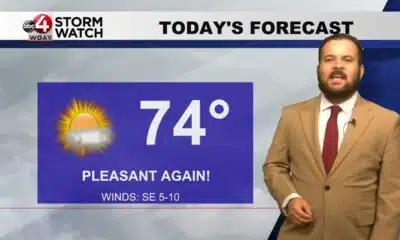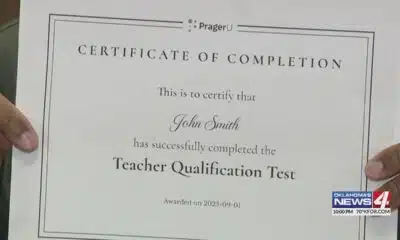News from the South - Florida News Feed
Medicaid cuts could rock state’s budget, provider pay, and the care being delivered
by Christine Sexton, Florida Phoenix
April 30, 2025
Amid political dysfunction in Tallahassee, advocates for the poor are more worried about potential Medicaid budget cuts in Washington, D.C., than the fallout that could happen over the next few days and weeks in the Florida Capitol.
Deep reductions in spending on Medicaid and food programs for low-income families would have a crushing effect on Florida — from state government, which would have to absorb more of the financial burden; to health care providers who could see their reimbursement rates cut; to the 4.2 million Florida residents who rely on the health care safety net for some form of health care coverage.
Congressional Republicans are intent on deep cuts to Medicaid — $880 billion in the House plan over the next decade and $4 billion for the Senate. The money would extend President Trump’s 2017 tax cuts.
But with a recent poll showing no appetite across the political spectrum for cutting Medicaid to pay for tax cuts, Florida advocates hope to convince Congress to reconsider.
The uncertainty comes as Florida lawmakers remain at odds over a new state budget and whether to go forward with a substantial cut in the sales tax rate. Senate President Ben Albritton has said he is unwilling to go along with deep tax cuts for fear of substantial “shortfalls.” Florida contributes a significant portion of the taxes collected at the state level to pay its share of Medicaid.
Florida Policy Institute Chief Strategy and Development Officer Holly Bullard appeared during a webinar along with Joan Alker, executive director and co-founder of the Georgetown University McCourt School of Public Policy Center for Children and Families (CCF) and a research professor at the Georgetown McCourt School of Public Policy; Lynn Hearn, advocacy director, Florida Health Justice Project; and Asheena Moses, statewide outreach and advocacy manager, Florida Impact, to discuss the pending cuts and how they would undermine the state budget if enacted.
Alker shared statistics that underscore how large the Medicaid program is in Florida. In all, she said, Florida receives about $19.5 billion in federal funding for Medicaid, 44% of all federal funds that come into the state.
“That’s an important context, because Medicaid cuts, federal Medicaid cuts, will have a huge impact on the state’s budget — obviously, on Medicaid itself but more broadly on the state’s budget and ability to finance other priorities such as education, infrastructure, public health — whatever it is,” she said.
In Florida, Medicaid pays for 58% of nursing home stays and 42% of births. Nearly 52% of Florida children living in small towns and rural areas are covered by Medicaid or the Children’s Health Insurance Program (CHIP). Similar to Medicaid, the federal government helps pay the costs of the CHIP program.
“This is extremely meaningful coverage that is really providing just a safety net for so many people, so it covers our most vulnerable individuals at the most vulnerable stages of their lives. So obviously, these aren’t just statistics. They’re real-life people,” said Hearn, whose organization advocates for health care access for all and equity.
GET THE MORNING HEADLINES.
‘Polly’
Florida established its Medicaid program in 1970. As of February, the latest available data, the program covered 4.2 million people, mostly through Medicaid managed care plans.
The $38 billion program is one of the largest in the nation, but it’s conservative in its approach and who it covers.
“We are pretty frugal when it comes to per capita and per enrolled spending in the Medicaid program,” said Justin Senior, who served as secretary of the state Agency for Health Care Administration (AHCA) for former Gov. Rick Scott and the state’s Medicaid director before that.
He is now CEO of the Safety Net Hospital Alliance of Florida, which represents some of the largest hospitals in the state, including Jackson Health System, Orlando Health, and Tampa General Hospital.
“If you’re looking for states that don’t spend a lot of money on Medicaid, then Florida has been an excellent steward of taxpayers’ dollars,” he said.
Indeed, Florida legislators maintain that the safety-net program should serve those who need assistance most, such as people with developmental and intellectual disabilities, including “Polly,” who lives in Jacksonville.
Polly’s sister Betsy Dobbins, participated in the webinar with Bullard and Alker to discuss the proposed Medicaid cuts. They would be devastating for Polly, who after nine years on a waiting list was enrolled in the Medicaid waiver program for people with developmental disabilities known as the iBudget program, Dobbins said.
Polly uses iBudget for home and community-based services that keep her living outside of an institution, and attends a day program at the local social services facility run by The Arc. She relies on Medicaid for traditional health care services such as doctor appointments, too.
“Medicaid cuts would be hugely detrimental for Polly in any shape or form,” Dobbins said. “Not just for Polly, but for us and for all of these people who are working every day to take care of people in these health care and systems of care for people like Polly.”
There are really huge cuts that could completely miss Florida and there are big cuts that could hit us.
– Safety Net Hospital Alliance of Florida CEO Justin Senior
Although Republicans in the House and Senate have decided upon deep cuts, the particulars remain unsettled. Without knowing those details, Senior said, it’s difficult to see how the reductions will land.
“There are really huge cuts that could completely miss Florida and there are big cuts that could hit us,” Senior said.
KFF analyzed potential repercussions for the states and found Florida would experience a $4 billion recurring reduction in federal Medicaid spending over the next decade if the full $880 billion House cut becomes law. The KFF analysis is illustrative and assumes the federal cuts are proportionally applied to states based on their share of federal spending, and not on policy decisions.
“In practice, cuts would almost certainly not be allocated proportionately, and some states would be disproportionately impacted depending on the specific policy proposals pursued. Without specific policies yet under consideration by Congress, this illustrative analysis is a way of understanding the magnitude of the potential Medicaid cuts,” the authors note.
One proposed reduction that wouldn’t harm Florida involves the federal Medicaid match for states that expanded the program to low-income working adults under the Affordable Care Act. The federal match for that population is 90% — more generous than the traditional Medicaid match which for Florida is roughly 58% (it’s higher for CHIP). That means the federal government pays 58 cents of every Medicaid dollar spent in Florida.
Another way to reduce federal spending is to crack down on so-called “health care provider taxes,” which the state uses as its required match to help fund the program.
Nursing homes, hospitals, and intermediate care facilities for people with developmental and intellectual disabilities assess these “taxes” upon themselves, rather than run them through the state fiscal system. This allows the state to book lower social services spending while supplying cash for the federally mandated Medicaid match. The mechanism is common among the various states.
The Congressional Budget Office has argued that Congress could save hundreds of billions of dollars by altering or eliminating provider tax options. The discussions generally center around lowering the “safe harbor” that allows states to use hold-harmless arrangements when the provider taxes don’t exceed 6% of net revenue from treating patients.
Hold-harmless arrangements ensure that the taxes collected are returned to providers in the form of higher Medicaid payments.
Hospitals’ provider taxes run well below that 6% safe harbor, so if Congress adjusts that slightly downward it shouldn’t beggar those providers, Senior said.
His association has been lobbying Congress, trying to ease any hit on Florida’s Medicaid program. So, too, has the Florida Health Care Association, which represents a large swath of Florida’s nursing homes.
“With over two-thirds of our residents relying on Medicaid to cover the cost of their long-term care, reductions to the provider assessment could limit options for our frail elders and their families,” FHCA spokesperson Kristen Knapp said in a written statement.
“We’re working with the American Health Care Association to help Congress understand that Medicaid is a key safety net for our most vulnerable and it must remain strong as our aging population continues to grow,” she said.
The first Trump administration tried to crack down on Medicaid provider taxes. Then–Florida Medicaid Director Beth Kidder wrote a letter opposing the move, saying it would “cripple” the state’s Medicaid program.
Senior, though, is a little more hopeful than Kidder.
“We got to see where it all lands. You could see a package of reductions that would impact Florida or you could see a package that wouldn’t have much of an impact on Florida or Florida hospitals at all,” he said.
Why now?
With some economists predicting a 60% chance of a recession during 2025, Alker also wants to know: Why now?
Medicaid is a counter-cyclical program, meaning enrollment increases during economic downturns. Congress, recognizing that, has generally increased federal matching funds during recessions, Alker noted.
“The fact that Congress would be contemplating one of the biggest cuts in Medicaid that we likely have ever seen at a time when, if the country is going into recession, normally Congress would be increasing Medicaid funding, I think, is a really important point.”
Don’t forget about the food
Advocates also warned about reductions to SNAP, the federal Supplemental Nutrition Assistance Program, which serves 2.9 million people in Florida. Since the program’s inception, the benefits have always been federally funded, although the state has had to pay half the costs of administering the program.
As part of the budget process, the House agreed to trim $230 billion in agricultural spending. However, there are widespread doubts Congress would cut farm subsidies and will look to cut the SNAP program instead, said Bullard, of the Florida Policy Institute.
“We want to lift up that this additional care program that is also counter-cyclical that is also something that our communities rely on that it is under threat as well.”
Hearn says the federal government is considering requiring the states to help pay for the costs of the benefit.
“And states have never had to do this before, nor are they prepared or have had conversations to do so. And so, just straight math is pretty easy to understand what this would do to the states’ budgets,” Hearn said.
A 10% cost shift to the state would increase costs for Florida by $657 million annually, Hearn said.
Asheena Moses, outreach and advocacy manager for Florida Impact, said there’s a strong connection between good nutrition and good health. Florida Impact is a statewide organization dedicated to advancing health equity by eliminating hunger.
“If SNAP is provided to families and families are able to provide nutritious meals to their children, they are less likely to get sick and be dependent on Medicaid programs, Moses said.
“SNAP also lifts families out of poverty. It frees up funding for them to get out of debt and it also frees up funding for them to establish themselves in a way that they can be self sufficient — like paying for trade programs or paying for different certifications so that they can get jobs where they make enough money to be lifted out of poverty and difficult situations,” she said.
YOU MAKE OUR WORK POSSIBLE.
Florida Phoenix is part of States Newsroom, a nonprofit news network supported by grants and a coalition of donors as a 501c(3) public charity. Florida Phoenix maintains editorial independence. Contact Editor Michael Moline for questions: info@floridaphoenix.com.
The post Medicaid cuts could rock state’s budget, provider pay, and the care being delivered appeared first on floridaphoenix.com
Note: The following A.I. based commentary is not part of the original article, reproduced above, but is offered in the hopes that it will promote greater media literacy and critical thinking, by making any potential bias more visible to the reader –Staff Editor.
Political Bias Rating: Left-Leaning
The content predominantly highlights concerns about potential cuts to Medicaid and SNAP, two programs that are critical for low-income individuals. It emphasizes the negative impact these reductions could have on vulnerable populations and underscores advocacy efforts to protect these programs. The language used often portrays the proposed cuts as harmful, framing them in terms of fairness and public health. While the article includes some quotes from conservative figures, the overall tone is more aligned with advocacy for social safety nets and critiques of Republican fiscal policies, indicating a left-leaning perspective.
News from the South - Florida News Feed
Rudy Giuliani leaves the hospital after being injured in a car crash in New Hampshire
SUMMARY: Rudy Giuliani, 81, was released from the hospital after a car accident in New Hampshire where the vehicle he was in was struck from behind on Interstate 93. Giuliani sustained a fractured thoracic vertebra, multiple lacerations, contusions, and injuries to his left arm and leg. He and the driver, spokesman Ted Goodman, were helping a woman who reported a domestic violence incident when the crash occurred. Both suffered non-life-threatening injuries. The crash’s cause is under investigation, with no charges filed. Giuliani, known as “America’s mayor” for his 9/11 leadership, later served as Trump’s personal attorney, involved in controversial election fraud claims.
The post Rudy Giuliani leaves the hospital after being injured in a car crash in New Hampshire appeared first on www.news4jax.com
News from the South - Florida News Feed
Polls to open in Florida Senate, House special elections. How to find out if you should be voting
SUMMARY: Election Day in west Orange County, Florida, on Tuesday features special elections to fill two Florida Legislature vacancies in Senate District 15 and House District 40. Senate District 15 includes northwest Orange County areas like Winter Garden and College Park. The seat was vacated by the late Sen. Geraldine Thompson. Democratic State Rep. Bracy Davis faces Republican Willie J. Montague for the Senate seat. In House District 40, RaShon Young, Davis’ former chief of staff, won the Democratic primary and will compete against Republican Tuan Le and write-in Chris Hall in the Sept. 2 general election. Polls open 7 a.m.–7 p.m.; vote-by-mail ballots are due by 7 p.m.
The post Polls to open in Florida Senate, House special elections. How to find out if you should be voting appeared first on www.clickorlando.com
News from the South - Florida News Feed
Here’s what we know about COVID shots in Florida
SUMMARY: In Florida, confusion grows over COVID-19 vaccine access. Jen, a Tampa resident with an underlying condition, struggles to find vaccination sites despite consistent annual shots. Pharmacies like CVS now require prescriptions for vaccines in 16 states, including Florida, while Walgreens limits availability. The FDA approved the 2025/26 vaccine mainly for those 65+, requiring high-risk younger individuals to have prescriptions. Florida Surgeon General Dr. Joseph Ladapo opposes the vaccine, calling it unsafe. This hesitancy contrasts federal messages supporting choice, as CDC advisory meetings may soon clarify guidelines amid politicized debates. Many Floridians remain uncertain about vaccine availability and eligibility.
The post Here’s what we know about COVID shots in Florida appeared first on www.tampabay28.com
-
Mississippi Today2 days ago
DEI, campus culture wars spark early battle between likely GOP rivals for governor in Mississippi
-
Mississippi Today6 days ago
Judge: Felony disenfranchisement a factor in ruling on Mississippi Supreme Court districts
-
News from the South - North Carolina News Feed5 days ago
Parasocial party: Why people are excited for the Taylor Swift, Travis Kelce engagement
-
News from the South - Louisiana News Feed5 days ago
K+20: Katrina alters local health care landscape, though underlying ills still the same
-
Our Mississippi Home7 days ago
Katrina Remembered: A Hattiesburg Perspective
-
Mississippi News Video7 days ago
Today’s First Alert Weather Kid is Karson (8/26)
-
Local News7 days ago
Parents of missing 7-month-old California boy are charged with murder
-
Our Mississippi Home6 days ago
The Great Backyard Recovery – Helping Birds After the Storm









































